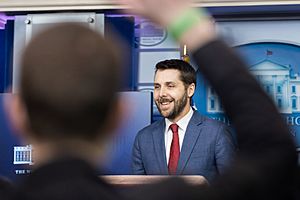Brian Deese facts for kids
Quick facts for kids
Brian Deese
|
|
|---|---|

Deese in 2022
|
|
| Director of the National Economic Council | |
| In office January 20, 2021 – February 21, 2023 |
|
| President | Joe Biden |
| Preceded by | Larry Kudlow |
| Succeeded by | Lael Brainard |
| Senior Advisor to the President | |
| In office February 23, 2015 – January 20, 2017 |
|
| President | Barack Obama |
| Preceded by | Pete Rouse |
| Succeeded by | Jared Kushner Stephen Miller |
| Director of the Office of Management and Budget | |
|
Acting
|
|
| In office June 9, 2014 – July 28, 2014 |
|
| President | Barack Obama |
| Preceded by | Sylvia Mathews Burwell |
| Succeeded by | Shaun Donovan |
| Deputy Director of the Office of Management and Budget | |
| In office June 27, 2013 – February 13, 2015 |
|
| President | Barack Obama |
| Preceded by | Heather Higginbottom |
| Succeeded by | Russell Vought |
| Personal details | |
| Born |
Brian Christopher Deese
February 17, 1978 Belmont, Massachusetts, U.S. |
| Political party | Democratic |
| Spouse |
Kara Arsenault
(m. 2007) |
| Education | Middlebury College (BA) Yale University (JD) |
Brian Christopher Deese, born on February 17, 1978, is an American expert in economics and politics. He worked as a top advisor for two U.S. Presidents, Barack Obama and Joe Biden. He was the main director of the National Economic Council under President Biden. This council helps the President make important decisions about the country's economy. Before that, he also held important roles in the Obama administration, including helping manage the government's budget.
Contents
Early Life and Education
Brian Deese was born in Belmont, Massachusetts. He studied political science at Middlebury College, earning his degree in 2000. Later, he went to Yale Law School and became a lawyer in 2009. In 2002, he was a finalist for the Rhodes Scholarship, which is a very special award for students.
Career Beginnings
Deese started his career working for different research groups. He was a junior fellow at the Carnegie Endowment for International Peace. He also worked as a research assistant at the Center for Global Development. There, he helped write a book about helping countries with their debt. Later, he became a senior policy analyst at the Center for American Progress.
Working on Presidential Campaigns
After his work at the Center for American Progress, Deese joined Hillary Clinton's presidential campaign in 2008. He was her director for economic policy. When Clinton's campaign ended, Deese then became an economic advisor for Barack Obama's presidential campaign. After Obama won the election, Deese helped with the team that prepared for the new president to take office.
Roles in the Obama Administration
Brian Deese held several important jobs during President Obama's time in office. He helped shape economic policies and worked on major national issues.
Helping the Economy and Auto Industry
When President Obama first took office, Deese became a special assistant for economic policy. He worked in the National Economic Council (NEC). He became very important in helping the U.S. auto industry during a difficult time. He helped with the government's plan to save companies like Chrysler and GM. Deese believed that letting Chrysler close would hurt many communities.
In 2011, he became the deputy director of the NEC. In this role, he helped create policies for taxes, money rules, housing, and clean energy. He was known as one of Washington's "most powerful, least famous people."
Managing the Government's Budget
In 2013, Deese was named deputy director of the Office of Management and Budget. This office helps the President manage the government's money. For a short time in 2014, he was the acting director of this office.
Senior Advisor and Climate Action
After 2015, Deese became a Senior Advisor to the President. In this role, he focused on climate and energy issues. He played a key part in creating the Paris Climate Agreement in December 2015. This agreement was a global effort to fight climate change. He worked with countries like China, India, and Brazil to reach these agreements.
Deese also led efforts to get the Paris Agreement approved. He helped create a global agreement to reduce certain gases called hydrofluorocarbons (HFCs). This was done through the Kigali Amendment to the Montreal Protocol. He also helped protect more land and water than any previous president. This included creating the world's largest protected marine area. President Obama praised Deese for his work, saying he "may have helped save the planet."
Deese also helped negotiate a budget agreement in 2015. This agreement increased government spending for two years. In 2016, he helped with the process of choosing a new Supreme Court Justice.
Work at BlackRock
From 2017 to 2020, Brian Deese worked as the Global Head of Sustainable Investing at BlackRock. BlackRock is a very large investment company. His team focused on finding investments that were good for the environment and society. Deese explained that BlackRock wanted to give clients more choices for investments. He said it was about understanding which companies were better prepared for a shift towards a cleaner economy.
Leadership in the Biden Administration
On December 3, 2020, President-elect Biden chose Brian Deese to be the Director of the National Economic Council. In this job, Deese helped coordinate economic policy for the country.
Shaping Economic Policy
Deese was a main architect of President Biden's economic plans. These plans included the American Rescue Plan, which helped people during the pandemic. He also helped create the Bipartisan Infrastructure Law, which improved roads and bridges. Other important laws he worked on were the CHIPS and Science Act and the Inflation Reduction Act.
President Biden said that Deese could "translate complex policy challenges into concrete actions." Deese was also known for building a diverse team at the National Economic Council. He played a central role in talking with members of Congress to pass the Bipartisan Infrastructure Law.
Modern Industrial Strategy
In 2022, Deese talked about the need for a modern industrial strategy for the U.S. He believed that the government should invest in important industries. This would help the country's economy grow and compete globally. He worked closely on the CHIPS and Science Act. This law aims to boost the making of computer chips in the U.S. After the law passed, President Biden asked Deese to help lead its implementation.
Climate and Competition Focus
Deese was also a key negotiator for the climate, health, and tax parts of the Inflation Reduction Act. He was especially involved in the clean energy and climate sections. He visited West Virginia to discuss these plans. He also helped with the final secret negotiations for the bill. Environmental leaders praised Deese for his role in creating this important climate law.
As NEC director, Deese also focused on making the economy more competitive. He helped create the first-ever White House Competition Council. He spoke about the need to help new businesses start and grow.
In February 2023, it was announced that Deese would leave his position. Lael Brainard took over his role.
Current Role at MIT
In July 2023, Brian Deese was appointed the Institute Innovation Fellow at MIT. In this role, he researches and develops ways to address climate change. He also works on promoting sustainable economic growth. His experience in government helps connect policy-making with new technologies. MIT hopes his work will help solve global climate challenges.
Images for kids
 | James Van Der Zee |
 | Alma Thomas |
 | Ellis Wilson |
 | Margaret Taylor-Burroughs |



